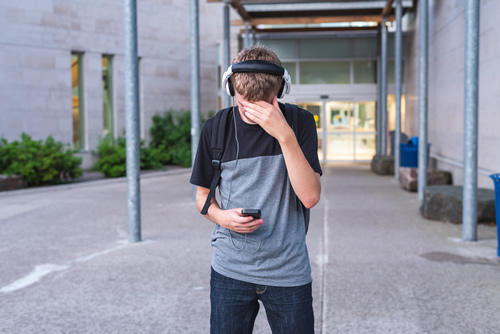Research from a recent white paper highlights the increasing crisis in adolescent mental health. In a recent edWebinar, presenters emphasized the need for school districts “to intervene with students as quickly as possible to keep them safe.”
The rise of anxiety and depression
Anxiety and depression rates are increasing, and suicide is now the second-leading cause of death for 10- to 19-year-olds across the spectrum of race, gender, and socioeconomic levels.
Related content: 3 no-cost ways to support mental health in schools
Seventy percent of teens cite anxiety and depression as a significant problem for their friends and their peers, and 40 percent of students report that bullying, substance, and alcohol abuse are affecting fellow students. More than 10 million students between the ages of 13 to 18 need professional help for a mental health condition.
This situation is a “mental health tsunami,” moving very fast in schools across the country, and the pressure is on. Some of the underlying causes of adolescent stress identified by mental health professionals include academics, social media, and childhood trauma such as homelessness and abuse.
Gateways to mental health issues
Schools struggle as students are exposed to online gaming, pornography, social media, and pro-self-harm websites when using technology outside of the school walls. While not evil, technology can be a gateway to some of the harmful behaviors we find in students who are in a crisis, such as gambling, sex addiction, eating disorders, self-harm, and suicidality.
Approaches by school districts
So how can school districts create a response system that supports students? There are several approaches that districts are taking to deal with adolescent mental health issues, including school-wide interventions, adding more support for students, and extending services from community helpers.
Dickinson ISD has taken a community-based approach by partnering with Gaggle, local law enforcement agencies, and coordinating agencies to intervene when there is a concern. This collaborative approach lets students know that the school community cares about them and that the community will take appropriate measures to support the health and well-being of students. Another school district that has an impactful influence on adolescent mental health is the Nampa School District. Taking an intra-district approach with the school community, district leaders created the Nampa Behavioral Youth Impact Team. This team identified three themes to define the problem and create proactive measures: school culture, adult and student relationships, and student-led learning.
Mental health is a growing crisis for our adolescent populations, but there are tools and resources available to schools and districts. Only when school and local communities focus on a common goal can they create safe and healthy learning experiences for all students. The presenters ended the edWebinar by echoing a common theme: Everyone has a vested interest in growing safe, secure, healthy kids.
About the presenters
Dr. Lisa Strohman is a clinical psychologist, author, public speaker, and the founder and director of Digital Citizen Academy. She established Digital Citizen Academy to proactively prevent and educate students, educators, and parents on the issues resulting from technology use and misuse. Dr. Strohman has spent more than a decade working with adolescents and families in her private practice and a career working with schools to address challenges with student mental health and well-being. Dr. Strohman was a visiting scholar for the FBI working on homicidal pedophilia when the Columbine tragedy occurred, giving her the opportunity to be on the front lines of how technology impacts our youth. She has continued to work with law enforcement and the FBI on safety and cybercrimes involving adolescents, while also lending her knowledge and guidance to the National Center for Missing and Exploited Children.
Kathleen Tuck oversees internal and external communications for the Nampa School District, the third-largest district in Idaho. As the district’s community relations liaison she coordinates community partnerships and outreach. A former journalist covering K-12 education, she has more than 20 years of public information experience, having worked for both higher education and K-12 institutions.
Dr. Melissa Williams-Scott is a 25-year educator, the last eight leading a Technology Department. She has a PreK-12 campus experience that includes a variety of student populations and communities. She also serves as an adjunct professor for preservice teachers at the University of Houston- Clear Lake Campus. Much of her career in education has focused on working with students with emotional disorders as well as serving on crisis response teams.
About the host
Annie Galvin Teich is a writer, editor, and content marketer who has spent more than 25 years working in educational publishing and education technology. She has significant experience in sales and marketing, business development, corporate communications, copywriting, and product development. Whenever possible, she is outspoken about funding school and public libraries.
Join the community
School Safety is a free professional learning community on edWeb.net that provides educators, school staff, school leaders, and district administrators with a place to collaborate on security and planning best practice strategies to keep schools and children safe.
This edWeb broadcast was sponsored by Gaggle. The recording of the edWebinar can be viewed by anyone here.
- Turning classroom boredom into student brilliance - December 27, 2024
- Special education staffing shortages put students’ futures at risk–how to solve that is tricky - December 27, 2024
- 5 major education trends of 2024 - December 26, 2024


